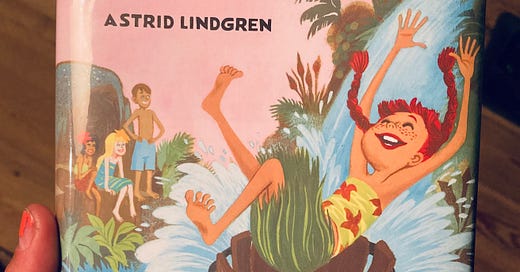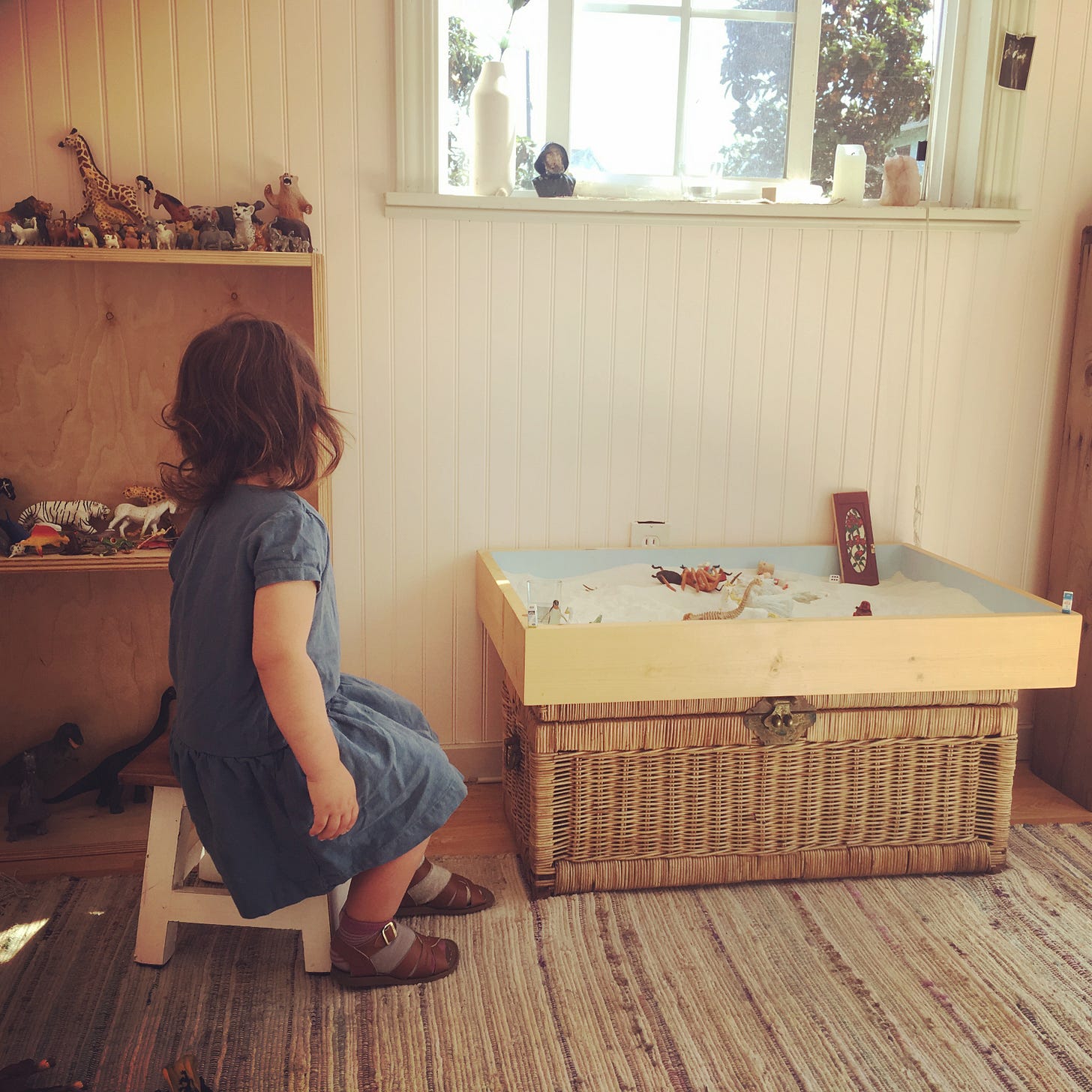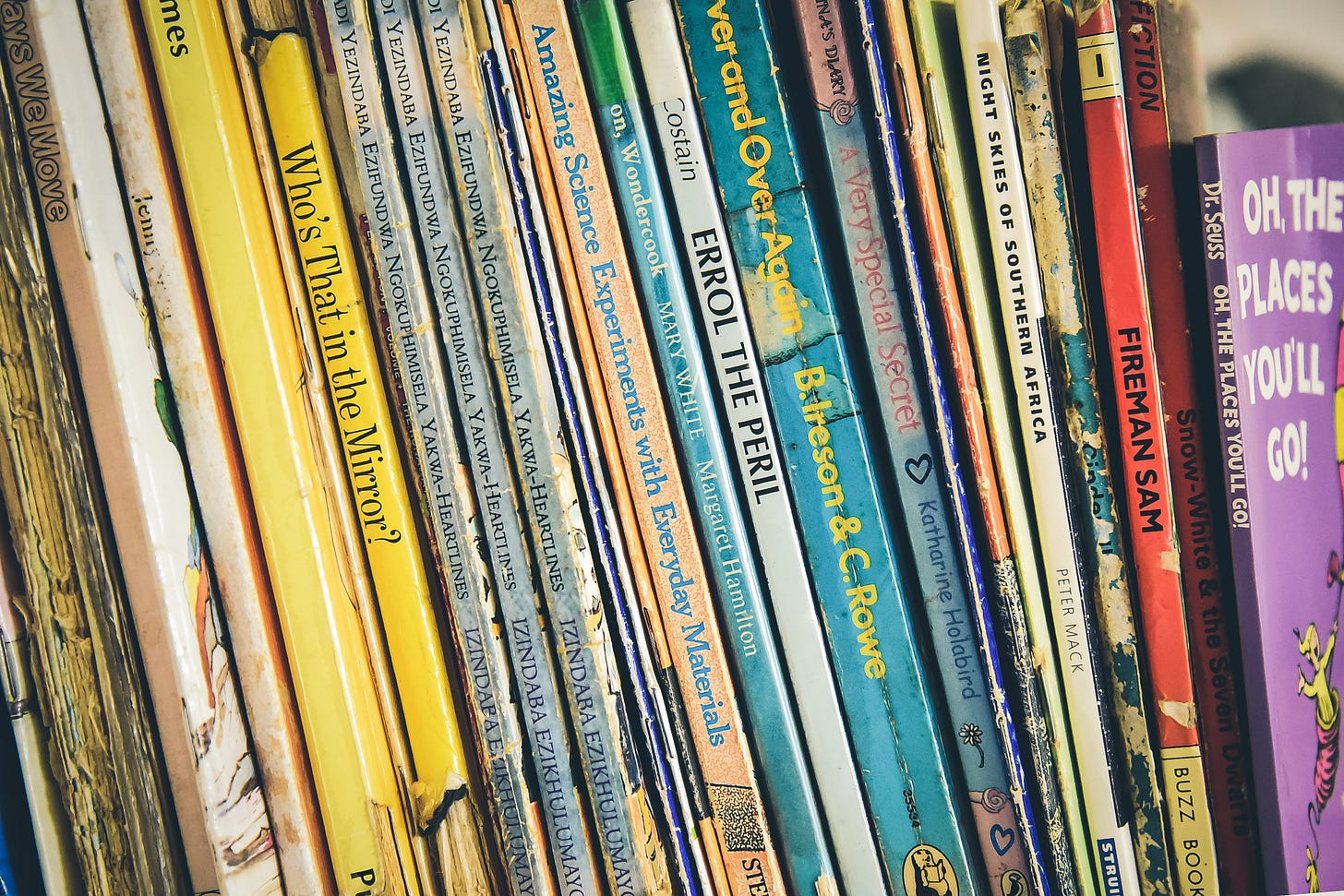Pippi Longstocking is having a moment in our house. My child wants to go live with her. We sort of have a monopoly on her books at the library.
For those unfamiliar, Swedish writer Astrid Lindgren created Pippi Longstocking and her adventures in the ‘40s for her daughter as she was recovering from pneumonia. Pippi is 9, has bright red braids that stick straight out and lives alone (she has a horse and a monkey). For Tommy and Annika, the well-mannered children who live next door, life with Pippi removes the mundane. Adventure becomes inevitable.
One of my favorite things about Pippi is how unfazed she is by most things. Whether robbers are in her bedroom or she just fell into shark-infested waters, she maintains a matter-of-factness that is surprising for a child. Actually, for anyone. She represents a fierce sense of justice and fairness through redirection—and play—instead of punishment. She’s also the strongest girl in the world, so since no boa constrictor or tiger has anything on her, she has little reason to be afraid. There is arguably no better representative of living life to the fullest than Pippi Longstocking.
The other night at bedtime, we read this:
Suddenly a dark shadow fell over Tommy’s face. “I never want to grow up,” he said firmly.
“Not me either,” said Annika.
“No, it’s nothing to long for,” said Pippi. “Grownups never have any fun. All they’ve got is masses of boring old work and stupid clothes and corns and dinkum tax.”
“Income tax, you mean,” said Annika.
“Same old bunkum, anyway,” said Pippi. “And they’re full of superstition and shenanigans. They believe there’ll be a horrendous accident if they happen to put a knife in their mouth when they’re eating, and stuff like that.”
“And they’ve no idea how to play,” said Annika. “Ugh, to think you’ve got to grow up!”
“Who says you have to?” asked Pippi. “If I remember rightly, I’ve got a few magic beans somewhere.”
She rummages around and finds some shriveled beans that look suspiciously like very old peas, then guides her friends through the rituals necessary to ensure they never grow up.
I feel very implicated by this. Of course these themes are all over children’s literature: the useless grownup who has lost all imagination; the children who don’t want to grow up. But also, we are pretty boring.
I have a background in alternative education, went to Waldorf School as a kid, was an assistant in a Montessori School, and sent my daughter to Waldorf school for the 2019-20 school year that was interrupted by the pandemic. That fraught year changed a lot for me, and I came out of it very committed to public education, to the idea of a community pooling its resources and putting them toward one large collective group of children. I stand by that, and our school here is amazing. Librarians are free to read LGBTQ+ books, there’s a garden the children spend time in, there’s no question the school is staffed by people with big hearts.
But this year (at age 7) my daughter started saying she doesn’t like school, doesn’t want to go. Maybe she’s imitating others, trying something out, but she also would have been furious at me if I had made her stay home during Kindergarten. She loved daily “work time,” which was really play time, something that isn’t part of first grade.
There is no question that teachers are a deeply undervalued part of our social framework (the notion that a dude in a white coat who looks down my child’s throat once a year makes many times more than a woman who spends 7 hours a day for 180 days with her should make us all furious). Disclaimer: my critiques are almost always about the systems, not the individuals. But if I put on my Pippi glasses, climb a tree and look in, the whole thing does look pretty absurd. Highly structured days full of numbers and letters, limited physical moment—except for PE, which has its own set of us v. them dynamics and rules—and adults who talk to you “like they hate you and like you at the same time (my daughter’s words).”
There is a wonderful program in our school called Piip (coincidence?). It’s essentially a play therapy program for struggling children. I haven’t witnessed it firsthand, and there’s little about it on the website, but I did find this on a neighboring school’s website*:
Play is a child's way of communicating. It provides a means for children to express what they feel, when sometimes they may not have the words. It is a vehicle for the development of important skills. Play also helps a child learn coordination and social skills, as well as enhance their attention and concentration. It provides an avenue to build up self-esteem and increases self-confidence. Play is about learning and having fun. The ultimate goal of the Special Pal Program (P.I.P.) program is to help the child in school to make their school experience the best it can be.
If we know that play is the best tool for maintaining healthy behaviors, why do we: a) not consider it critical to the daily life of adults, and b) only offer this program to children who are already struggling? Why is play not the foundation of all education??
Many parents I talk with say they just wish our kids had more recess. This isn’t because we want to spoil our children, it’s because of joy. I’m not actually sure more recess is the answer. A lot of fucked up social dynamics go undetected on school playgrounds. But I do believe in more movement, in being outside, in running and jumping, but most importantly being left to invent things. To come up with our own ideas and take a break from following instructions.
The reality is no-one has the bandwidth to let 25 kids follow their hearts. That would be chaos. But I do think it’s tragic how early we start modeling that play is an accessory. This is why the adults are left out of children’s stories. Because we don’t get it. When kids are saying they want to do something, it’s often because they love doing it. And our response is to ration these opportunities, giving them 20 minute increments to find that transcendence.
Your Optional Assignment:
Pick a favorite childhood storybook character. At least once a day for the next week, ask yourself, in a moment of frustration or boredom or fear, “What would [Pippi] do?” Commiserate with your character about the absurdity of adulthood.







I love this post so much. BRING BACK PIPPi, BRING BACK PLAY! I remember the first time I ever went to Burning Man I was baffled and super inspired by the concept of adults just playing, for playing's sake. I hadn't seen that reflected in my life and it felt really healing. More play, please.